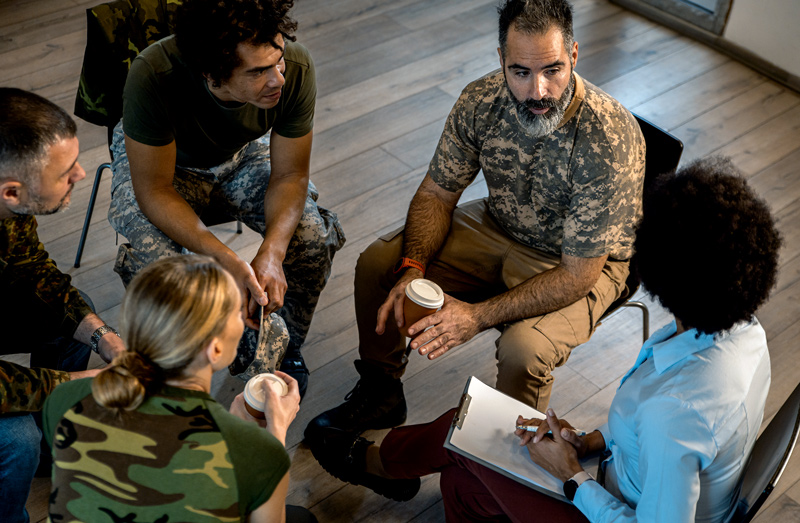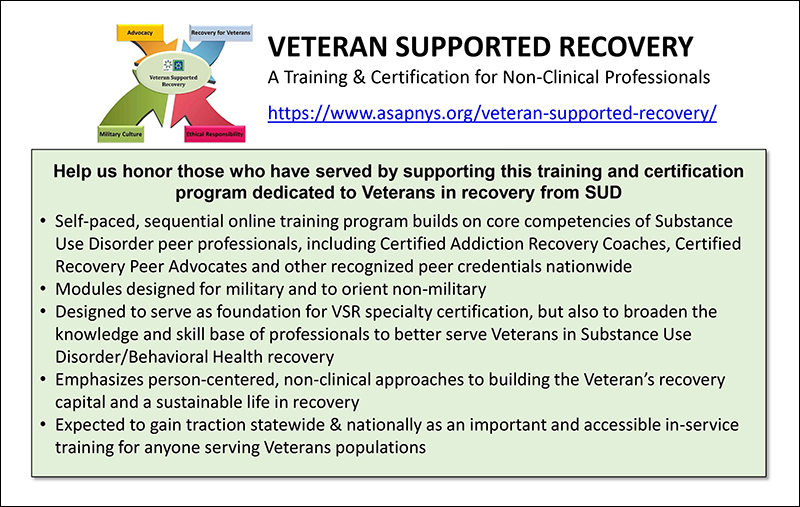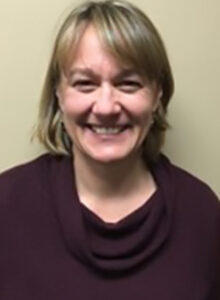The prevalence of suicide, addiction to alcohol and other drugs, homelessness, unemployment, incarceration, physical and mental health challenges, and the need for health and social services is disproportionate among Veterans compared to the general population. Among Veterans, one in six who served in Iraq/Afghanistan have a substance use disorder, one in five suffer from PTSD and/or a major depression; in 2021, more Veterans died by suicide than were killed in 10 years of war. Veterans have many challenges when they are reintegrating into the community where they live. Despite the alarming level of need and demand for services, Veterans and their families are considered an underserved population because so many have not received the care they need and deserve.

All too often, Veterans and their families have had to rely on support generated by community-based organizations and volunteers. Thanks to the vision, advocacy, and perseverance of people and organizations committed to supporting Veterans and their families, there is hope and a path forward that can help Veterans to attain the health and happiness they deserve.
A Visionary Response
At the Alcoholism and Substance Abuse Providers of New York State’s (ASAP) Veterans Summit in Tarrytown, New York in 2019, Malik Hutchinson, a member of ASAP’s Veterans Committee, expressed concern about inadequacies in the infrastructure needed by Veterans navigating the transition from military to civilian life. The Veterans Administration system helped some, but many Veterans were falling between the cracks. Malik was very concerned that Veterans suffering with addiction and/or mental health issues were at greatest risk for not getting the help they needed. He strongly advocated that a service should be developed where Veterans could be helped by people who understood their needs better than anyone else … other Veterans. The ASAP Veterans Committee took up the cause and the vision that Malik had created at the Veterans Summit became their vision as well.
At the request of the ASAP Veterans Committee, the New York Certification Board agreed to develop a Veteran Supported Recovery credential that could serve as a catalyst for Veterans to get the support they needed. With seed funding from the Mother Cabrini Foundation, the New York Certification Board (NYCB) began the work to develop a Veterans specific credential in March 2020. A group of subject matter experts composed of Veterans, military personnel, peer recovery professionals, and experts in peer certification, was convened to create the Veteran Supported Recovery (VSR) credential and a separate group of expert trainers was convened to develop the curriculum that would be used to train peers. While the training was designed to provide peer professionals with a solid foundation specific to working with Veterans, it was also designed for others who have an interest in working with Veterans. The VSR training was designed to broaden the knowledge/skill base of other professionals (including social workers, mental health counselors, and a broad range of professionals and volunteers) to better serve Veterans. Upon completion of the work to create the Veteran Supported Recovery credential and training curriculum, the ASAP/New York Certification Board VSR program was launched on Veterans Day 2021.
Strengthening Our Workforce
The New York Certification Board designed the Veteran Supported Recovery initiative for certified peer professionals who want to strengthen their knowledge and skills and attain the VSR specialty certification. The training curriculum is also designed for others looking to strengthen their work with Veterans and receive continuing education credits. The VSR Training and Certification Program includes a five-hour training module, required for certification candidates who are not veterans (now available online). This module is designed to give non-Veterans a more complete understanding of military culture, jargon, and values. The core 20-hour VSR training (available here) is designed to help people who work with Veterans and their families to strengthen their alignment with the specific needs of Veterans.
TVSR training is helpful for participants interested in expanding their peer recovery knowledge base, learning how to effectively navigate the challenges of supporting a Veteran with a substance use disorder, preparing for VSR certification, or earning approved continuing education hours for renewal of ASAP-NYCB peer recovery certifications. All VSR trainings are online with closed captioning for persons with hearing challenges.
The New York Certification Board is working to increase awareness about their VSR initiative with the hope that it will serve as a catalyst for strengthening the workforce, enhancing services for Veterans, and helping to improve the health and quality of life for Veterans and their families. Like other peer professionals, VSR professionals work in a wide variety of settings. They work in community-based substance use programs, recovery centers and recovery-oriented clubhouses, community mental health agencies, Veterans hospitals and community-based Veterans programs, as well as in Veterans housing and employment programs, or wherever Veterans are served.
Elisabeth Kranson is Director of the New York Certification Board.
To learn more about Veteran Supported Recovery and services that address the needs of Veterans and their families, attend the ASAP Veterans Summit or contact us at: 518-426-3122 or EKranson@asapnys.org.








